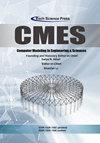地中海岛屿地区COVID-19的敏感性分析
IF 2.5
4区 工程技术
Q2 ENGINEERING, MULTIDISCIPLINARY
Cmes-computer Modeling in Engineering & Sciences
Pub Date : 2022-01-01
DOI:10.32604/cmes.2022.017815
引用次数: 1
摘要
本研究的目的是检查全球大流行Covid-19的进展。作为作者,我们决定用准确的数据分析地中海岛屿上的COVID-19情况。为此,建立了一个数学模型,将整个种群划分为合理的和合适的区域。该研究捕获了2021年2月1日至5月15日的日期。为了控制疾病的传播,对疫苗接种率和感染率进行比较和计算。在计算和比较过程中,使用MatLab软件。所使用的所有数据均来自卫生部。用灵敏度分析检验了参数的影响。通过分析,得到了各参数的取值。然后,利用构建的模型,分别分析了疫苗对感染个体的影响。结果表明,该地区对该疾病进行疫苗控制的时间较晚。这可以用两个主要原因来解释:为大多数时间不活动的人(老年人和慢性病患者)接种疫苗,以及接种疫苗的时间较晚。因此,结果表明,疫苗的这种比率和分配不足以控制岛上的大流行。本文章由计算机程序翻译,如有差异,请以英文原文为准。
Sensitivity Analysis of COVID-19 in Mediterranean Island
The aim of this study is to examine the progress of the worldwide pandemic Covid-19. As authors, we have decided to analyze the situation of COVID-19 on Mediterranean island with accurate data. For this purpose, a mathematical model is constructed and proposed by dividing the whole population into sensible and suitable compartments. The study captures the dates February 01 till May 15, 2021. For the control of the spread of disease, vaccination and infection rates are compared and calculated. During calculations and comparison, MatLab software is used. All of the data that are used are taken from the Ministry of Health. The effect of parameters is examined with sensitivity analysis. Furthermore, with this analysis, values of parameters are obtained. Afterwards, by using the constructed model, the effect of vaccine on infected individuals is analyzed separately. As a result, it is concluded that the studied part of the island is late for the control of the disease via vaccine. This can be explained by two main reasons;vaccinating the people that are not in mobility most of the time (aged people and people with chronic diseases) and getting the vaccine late. Hence, the results showed that this rate and distribution of vaccines would not be enough to control the pandemic on the island.
求助全文
通过发布文献求助,成功后即可免费获取论文全文。
去求助
来源期刊

Cmes-computer Modeling in Engineering & Sciences
ENGINEERING, MULTIDISCIPLINARY-MATHEMATICS, INTERDISCIPLINARY APPLICATIONS
CiteScore
3.80
自引率
16.70%
发文量
298
审稿时长
7.8 months
期刊介绍:
This journal publishes original research papers of reasonable permanent value, in the areas of computational mechanics, computational physics, computational chemistry, and computational biology, pertinent to solids, fluids, gases, biomaterials, and other continua. Various length scales (quantum, nano, micro, meso, and macro), and various time scales ( picoseconds to hours) are of interest. Papers which deal with multi-physics problems, as well as those which deal with the interfaces of mechanics, chemistry, and biology, are particularly encouraged. New computational approaches, and more efficient algorithms, which eventually make near-real-time computations possible, are welcome. Original papers dealing with new methods such as meshless methods, and mesh-reduction methods are sought.
 求助内容:
求助内容: 应助结果提醒方式:
应助结果提醒方式:


